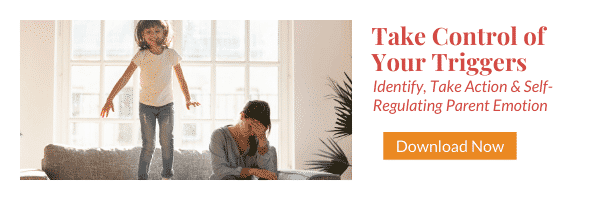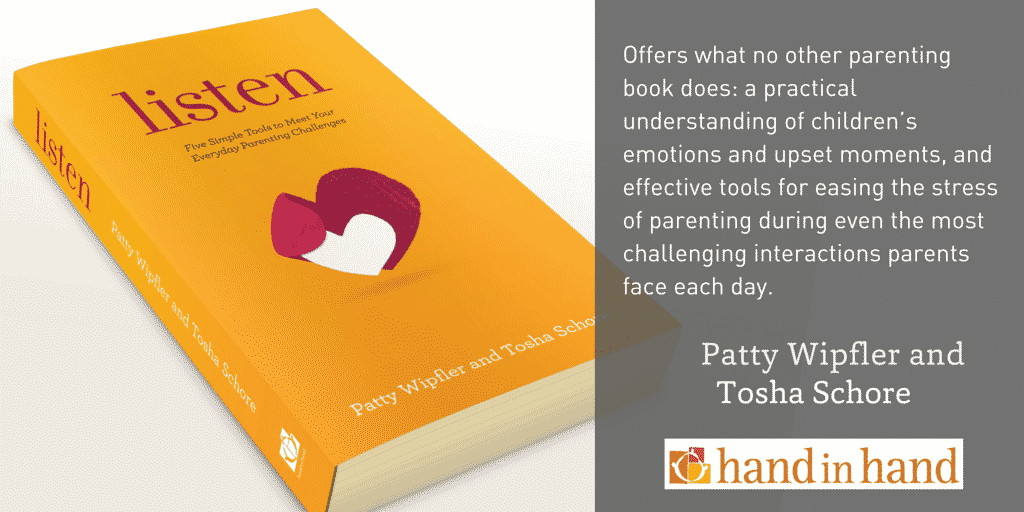Have you ever lost it with your child over something and not understood why?
- Why your son’s clinginess on a playdate drives you crazy?
- Why you snap if you see your oldest daughter hit your youngest?
- Why your blood races when your baby won't stop crying?
Despite your best intentions to keep calm and understanding, your emotions rush through you and overtake.
Before you know it, you are yelling at your son to get away from you and stomping away.
Or, your head is in your hands, tears running down your face while your baby screams in the crib.
And it keeps happening but you have no idea why!
Triggers Are Why You Keep Losing It With Your Kids
If the clinginess gets to you, think back.
Did you ever have a hard time saying goodbye at drop off as a child?
What about that hitting? Were you a younger child getting hit? Or the older child being punished for hitting?
Experience doesn't even have to be felt in the first person to be triggering. Maybe you saw an older child hitting a younger one, and stood by helplessly watching.
When we experience floods of unexpected emotion, you can be sure that behavior in the present is triggering some older experience you may barely even remember.
How The Brain Stores Memories Causes Parents to Flare
The brain stores these memories and when they are re-stimulated our systems become overwhelmed with feeling.
You might feel: anger, fear, or helplessness. You may feel judged, weak or unheard.
These feelings flare with great intensity, often taking us by surprise.
“Past hurt doesn’t have to come from a big trauma, although it can do,” says Sandra Flear, a psychotherapist, mother of two and a Certified Hand In Hand Parenting Instructor.
“A past hurt can stem from any experience where the relational support to be able to process and shed the feelings at the time they occur wasn’t there,” she explains.
Do you work with families? Hear Sandra talk about how triggers affect parents, and how you can help them move from reactive to responsive as part of your treatment plan. Listen now.
In short, your feelings were shut down in that moment. They were stored by the brain, but never fully processed.
These experiences can happen at any time, anywhere, from encountering an aggressive dog to living with tense or distracted parents. They could stem from bullying, being yelled at, or shushed and told to be quiet.
If your parents never listened to you cry, for instance, and instead got angry, told you to be quiet and sent you to your room to calm down, you can expect your baby's cries to trigger a fear response in you.
You may get angry.
You might feel bitter, and that it's unfair that you have to listen to crying now.
You might feel lonely or sad, just as you did then.
And if you don't realise you are triggered, you might also feel like you failed, you aren't being the kinder, more empathetic parent you wanted to be, and you might feel confused about how to change.
But you can change. In a moment, we'll share how.
Want to stop yelling at your kids? This free guide will help you work through your anger triggers towards calmer parenting. Get your guide.
How Did These Feelings Get Stuck, and Why Are They Surfacing Now?
First, a little brain science.
When a child experiences pain and isn’t heard, the experience gets stored differently from other memories in the brain.
“The brain releases a chemical that puts them into storage where they are mostly out of awareness but not completely,” says Sandra. “These overwhelming experiences continue to color our perceptions and can flood us at times.”
And then when we become parents, those memories stir.
Why?
Parenting evokes stored feelings because the demands on us as parents are constant, but also because our children so often remind us of ourselves as children or other people from our childhood, Sandra says.
When something in the present feels similar to an early negative experience our neural networks are tugged we are flooded with feelings.
You respond to your children in ways you don’t like. You might become enraged and yell, issue threats, or handle them more forcefully than you'd like.
Later you are consumed with guilt about what you feel must be an overreaction.
What you are actually responding to are stored hurts resurfacing.
So, how do you change? How do you stop reacting to the past emotion, and respond better to your kids?
How Releasing Stored Hurt Helps Us Move Through Overwhelm
In the moment, it can be helpful to notice when you become flooded.
Taking a minute to feel those sensations and acknowledge them can be calming.
To be completely free you need to do more than access the stored feelings. You need to release them, because releasing them is what really clears the feeling, leaving you calmer and lighter as parents.
How To Work Your Way Beyond the Anger, Fear or Sadness
One way to release our stored hurt is to revisit it.
Focusing on the early experience brings it back into your awareness, where it will intensify briefly.
If you can receive empathy, warmth, and understanding as you relive the experience, your brain will modify the neural network.
What does that really mean? It means that your memory of the experience returns to your brain’s long-term storage with the new, warmer reaction attached to it.
Your re-stimulation, your trigger will be less intense. Clinginess will feel easier. Your child's crying will bother you less.
The process works best if you relive your experiences with someone who can respond positively, someone who can give you the reaction you craved as a child, or when you first felt those experiences. Because shedding these hurts can leave us feeling exposed, your listener needs to be able remain calm, regulated and attuned towards your emotional state.
And It's best if they can direct you toward and stay with the emotional part of what you are experiencing.
When that safety is present, you get the freedom you need to re-live the pain but shed the hurt.
During this healing time of listening, you might cry, rage, sweat, laugh, shiver or say things that you needed to say at the time of the original experience.
You might also need to simply sit with the experience and share it with your listener, without words and without describing it.
Do that until you can welcome better responses, the things you needed to hear at that time. Things like:
- It wasn’t your fault
- You are worthy
- You are good
- You made it
You are looking for a feeling of relief. “This is a very vulnerable thing for parents to do but it’s full of opportunity for healing,” Sandra says.
During the listening session, or after it, you will feel more at peace and calmer.
And after a few times, you will almost certainly notice less intensity when your kids behave in ways that were triggering, giving you space to parent more calmly, even playfully.
Imagine that? Turning anger and rage into laughter and smiles?
It can be done.
And you can do it.
Remember These Five Steps When You Want to Work Through Hard Places in Parenting
- Identify your triggers
- Find different ways to behave in the trigger moment
- Relive those feelings, recalling the times you felt them before.
- Listen to more positive messages and reframe those memories.
- Observe how lighter you feel when your kids repeat behavior you once found triggering.
You can explore your triggers and ways to reframe them in this free guide.
For more on listening read this personal experience, Listening Partnerships Transform My Past take our Listening Partnerships Self-Guided Course and then read How to Find a Listening Partner
Meet the Instructor
 Sandra Flear, RP, DipTIRP, CPI is a mother of two from Canada, a registered psychotherapist and Certified Hand in Hand Instructor. You can read more of Sandra’s stories here. This post was inspired by a recent live call Sandra co-hosted on Parenting Triggers. Listen to the whole talk here.
Sandra Flear, RP, DipTIRP, CPI is a mother of two from Canada, a registered psychotherapist and Certified Hand in Hand Instructor. You can read more of Sandra’s stories here. This post was inspired by a recent live call Sandra co-hosted on Parenting Triggers. Listen to the whole talk here.


